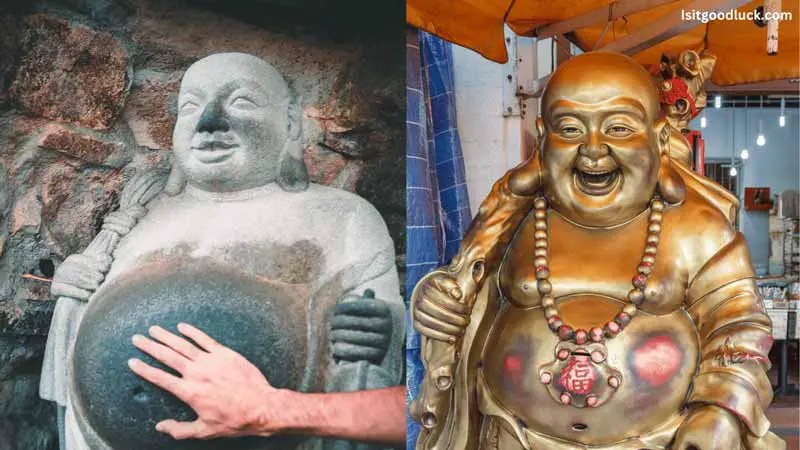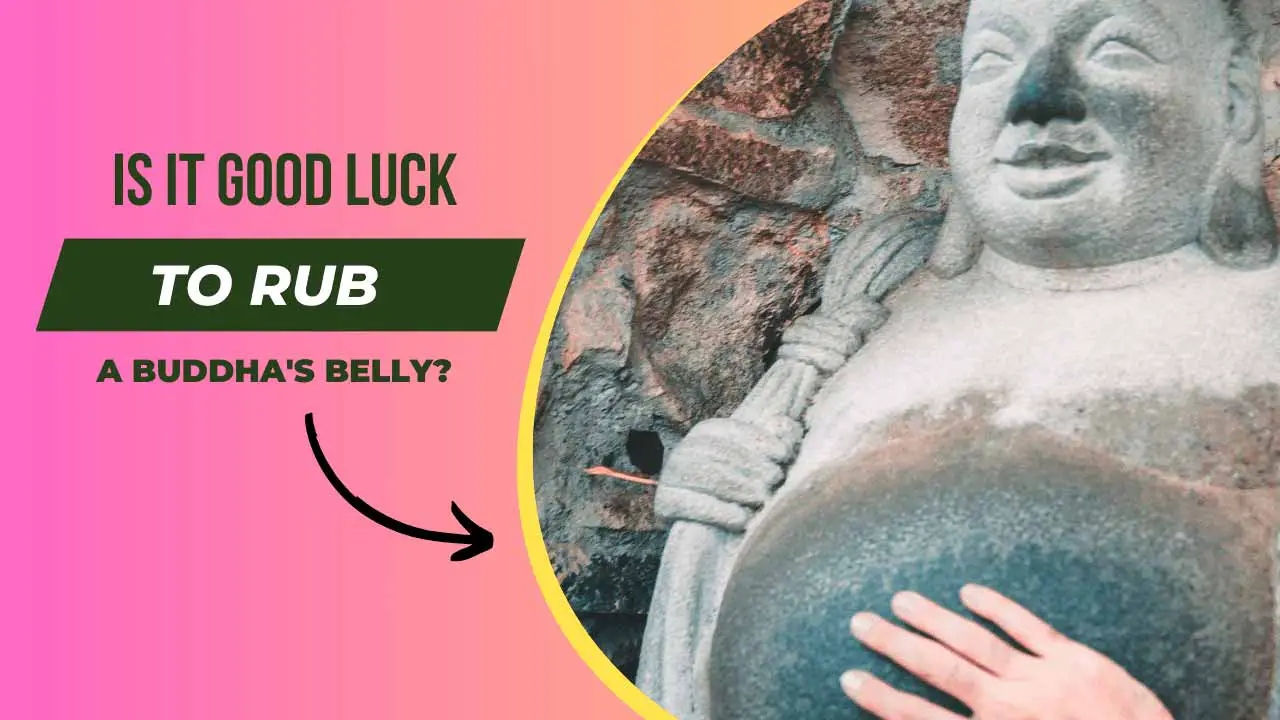“Is it good luck to rub a Buddha’s belly?” This question might sound unusual to some, but to many people worldwide, it’s an integral part of their traditions and beliefs.
This practice, steeped in symbolism, folklore, and spirituality, transcends religious boundaries and has garnered widespread recognition.
It’s rooted in the legend of Budai, a jovial 10th-century Chinese monk, and his embodied concept of happiness and prosperity.
But does rubbing a Buddha’s belly genuinely bring good luck, or is it merely a cultural myth? Let’s delve into this fascinating subject.
Contents
- 0.1 The Budai: A Symbol of Happiness and Prosperity
- 0.2 The Art of Rubbing Buddha’s Belly: A Tradition Across Cultures
- 0.3 Science, Belief, and Psychology: Do They Intersect?
- 0.4 Incorporating Buddha Statues in Daily Life:
- 0.5 Conclusion: Is It Good Luck to Rub a Buddha’s Belly?
- 1 FAQs
- 1.1 Is there a specific type of Buddha’s belly that should be rubbed for good luck?
- 1.2 Is there a correct number of times or a specific time of day to rub the Buddha’s belly?
- 1.3 Can anyone rub the Buddha’s belly, or is it only for followers of Buddhism?
- 1.4 What other parts of the Buddha statue can be touched?
- 1.5 Is it disrespectful to rub a Buddha’s belly?
The Budai: A Symbol of Happiness and Prosperity
In Buddhist art and iconography, there exist different types of Buddha statues, each with distinctive features and significance. The Laughing Buddha, as commonly referred to in the West, is a depiction of Budai.
Unlike the more traditionally svelte representations of Buddha, Budai is a character who lived in 10th-century China and is known for his portly stature and ever-present smile.
His name translates to “cloth bag,” referring to the sack he would carry, symbolizing contentment and abundance.
Rubbing Budai’s belly is said to invoke his generosity, transferring some of his positive energy to the individual. This energy is believed to influence various aspects of one’s life, promising better luck in finances, relationships, and health.
The Art of Rubbing Buddha’s Belly: A Tradition Across Cultures
Interestingly, rubbing Budai’s belly isn’t confined to one culture or region. Various societies, mainly throughout Asia, have embraced this tradition, each adding unique nuances.

The methods may differ from simple rubbing to complex rituals involving prayers and offerings. However, the underlying intention remains to attract happiness, abundance, and prosperity.
Despite the variety in approaches, some common elements persist. When engaging in this practice, it’s essential to maintain a sincere heart and positive intentions.
Also read: Is it Good Luck Receiving a Buddha Statue as a Gift?
Rubbing should be done gently and respectfully, preferably in a clockwise direction, mirroring the sun’s movement, universally seen as a symbol of life and positivity.
Science, Belief, and Psychology: Do They Intersect?
From a strictly scientific perspective, no empirical evidence suggests rubbing a Buddha’s belly results in tangible good luck. Nonetheless, it might offer psychological benefits that indirectly lead to positive outcomes in one’s life.
Physical touch, as simple as it might seem, is essential to human psychology. Studies indicate that touching or holding a loved one can release oxytocin, a hormone associated with happiness and well-being.
By analogy, rubbing a Buddha’s belly, a symbol of joy and prosperity, might trigger a similar response.
This action and the associated belief could elevate one’s mood and positivity, which might result in better decision-making, relationship-building, and overall mental health.
Incorporating Buddha Statues in Daily Life:
The influence of Buddhist art is not limited to temples and places of worship. Many homes and workplaces worldwide feature Buddha statues as decorative pieces that symbolize peace, wisdom, and abundance.
If you consider incorporating a Buddha statue into your personal or workspace, ensure it’s treated with the respect it deserves.
The statue should be placed in a clean, high, and uncluttered area, preferably facing the entrance. Avoid placing it in the bathroom, kitchen, or floor, as these locations are disrespectful.
When choosing the right Buddha statue, remember each type carries a different meaning. The famous Budai statue symbolizes joy and good luck, but others represent mindfulness, finding a path in life, or overcoming fear.
Conclusion: Is It Good Luck to Rub a Buddha’s Belly?
In conclusion, rubbing a Buddha’s belly as a charm for good luck blends tradition, belief, and psychology.
While scientific evidence might not directly endorse this practice, its positive effects on one’s mindset and mood are undeniable.
Whether you believe in the myth or not, one thing is clear: this practice, which inspires positivity, respect, and a mindfulness approach, can only bring about good feelings.
So, why give it a try? You may be surprised by the psychological and spiritual benefits it brings.
Also read other articles regarding Buddha’s good luck
FAQs
Is there a specific type of Buddha’s belly that should be rubbed for good luck?
The Buddha often associated with this practice is the Laughing Buddha or Budai, known for his ample belly and cheerful demeanor. Budai represents contentment, happiness, and abundance, making him the typical choice for those seeking good fortune.
Is there a correct number of times or a specific time of day to rub the Buddha’s belly?
There isn’t a universally prescribed number of times or a specific time of day to rub the Buddha’s belly. The key lies in the intention behind the act. It should be performed with a sincere heart, a positive mindset, and utmost respect.
Can anyone rub the Buddha’s belly, or is it only for followers of Buddhism?
The act of rubbing a Buddha’s belly transcends religious boundaries. While it stems from Buddhism, anyone can engage in this practice. It is more about cultural respect and personal belief in positivity and luck rather than a strict religious ritual.
What other parts of the Buddha statue can be touched?
While the belly of the Buddha, specifically the Laughing Buddha, is the most common area to touch for good luck, other parts of various Buddha statues are touched for different reasons. For example, depending on their pose, some people touch the Buddha’s hands, representing teaching or protection.
Is it disrespectful to rub a Buddha’s belly?
Rubbing a Buddha’s belly is not considered disrespectful if done with a pure heart and respectful intentions. It is a tradition based on invoking the Buddha’s blessings of happiness and prosperity. However, it’s essential to treat all religious and cultural symbols respectfully.





